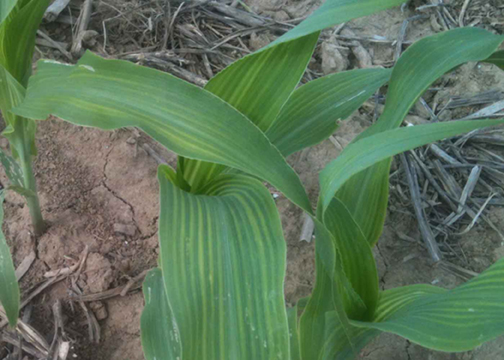Corn crop off to a late, but good start
Corn crop off to a late, but good start

Even though Kentucky producers were about a month behind in planting corn this spring, the crop is looking really good thus far, said Chad Lee, grain crops specialist with the University of Kentucky College of Agriculture, Food and Environment.
Despite many Kentucky producers not planting until the week of May 19, the National Agricultural Statistic Service rated 82 percent of the crop good or excellent as of July 1.
Planting delays along with possible nutrient deficiencies due to cool, wet weather had some producers concerned about the crop, especially since many of the same ones had significant yield losses due to the 2012 drought. A few weeks ago, the leaves of many plants were striped or turned slightly yellow or purple. Lee called this a transient deficiency.
“A transient deficiency occurs when a young plant experiences periods of weather that remain extra cloudy and/or wet and/or cool,” Lee said. “These types of deficiencies rarely result in yield losses, even in corn that yields more than 250 bushels per acre.”
He added that much of the crop has already bounced back thanks to a period of warmer, drier weather that helped the plants’ root systems expand and develop. Recent rainfall has allowed the plants to continue to grow.
“The symptoms that appeared to be nutrient deficiencies earlier in the season are now looking better,” Lee said. “In most plants, the deficiency symptoms started to disappear and were gone by the time the plant reached the V7 growth stage.”
This is important, because during the V7 stage, the kernel row number on the dominant ear is determined, the root system is functioning well and the plant starts rapid growth.
He added, even though the corn was a month late getting into the ground, Kentucky producers planted nearly 100 percent of their intended corn acreage.
Lee did caution that it is still very early in the growing season and having a good start does not always translate into good yields. The weather conditions when the corn is pollinating will play the most critical role in final yields.
Extension

